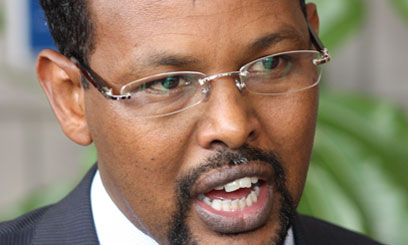
CIOC chairman Abdikadir Mohamed said on Wednesday that the committee would support proposals that political parties deposit a list of members of either gender with IEBC/FILE
CIOC chairman Abdikadir Mohamed said on Wednesday that the committee would support proposals that political parties deposit a list of members of either gender with the Independent Electoral and Boundaries Commission (IEBC) before the General Election.
The list will then be used for purposes of nominating MPs to fill the deficiency occurring in the National Assembly after the elections.
Mohamed spoke at County Hall after a meeting with the IEBC, the Commission for the Implementation of the Constitution, the Gender Minister, the Gender Commission, the State Law Office and the Law Reform Commission.
“We have agreed that we move with the proposal that we have a list before the elections filed with the IEBC,” he said.
“It’s a fairly complex process but also simple process, we already have nominations done in Parliament. The beauty this time is that the list is filed beforehand and it will be the product of a competitive election process supervised by the IEBC so that parties meet high standards than they currently do with nominations,” he added.
The committee now seeks to convince parliamentarians at an informal meeting on Thursday to proceed and adopt the proposal before the amendment on the gender rule is brought for debate.
On the downside the proposal is likely to attract criticism as in effect it calls for an increased number of parliamentarians if the one third gender rule is not met at the elections.
“It’s a fairly complex process but also simple process, we already have nominations done in Parliament. The beauty this time is that the list is filed beforehand and it will be the product of a competitive election process supervised by the IEBC so that parties meet high standards than they currently do with nominations,” he added.
The National Assembly as envisaged under the Constitution should be constituted of 350 members (290 elected MPs, 47 women, each elected from the counties, 12 members nominated by parliamentary political parties and the Speaker, who is an ex officio member).
However, the Constitution is also categorical that members of the same gender will not be more than two-thirds of the composition of the National Assembly.
Last Thursday an informal Parliament sitting called by the Speaker failed to agree on the formula to be used to realise the one third gender representation in Parliament.
MPs then decided to form a 10-member ad hoc committee to review three proposals suggested which included having two women elected per county.
MPs said that the meeting had also agreed to put on hold debate on a Constitutional Amendment Bill that seeks to provide a way forward over the two-third gender rule on representation.








































